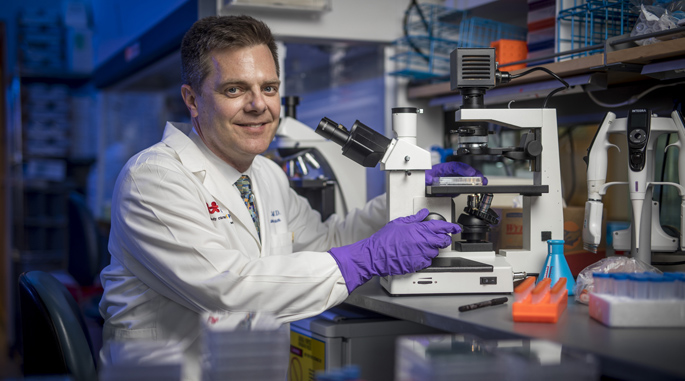by Bill Snyder
James Crowe Jr., MD, a physician-scientist at Vanderbilt University Medical Center who has pioneered development of human monoclonal antibodies as potential treatments for viral diseases, has won a 2020 “Golden Goose” Award.

The ninth annual Golden Goose Award ceremony on Dec. 1 will recognize Crowe and two other federally funded research teams for their scientific responses to COVID-19. Led by the American Association for the Advancement of Science, the Golden Goose Award committee includes a bipartisan group of Congressional supporters and several science and higher education organizations.
In October the global biopharmaceutical company AstraZeneca announced it was advancing into phase 3 clinical trials an investigational COVID-19 therapy consisting of two long-acting antibodies discovered in the Vanderbilt Vaccine Center (VVC), which Crowe directs, and optimized by AstraZeneca.
“We are incredibly proud of Dr. Crowe for receiving this recognition. It is especially meaningful that the Golden Goose Award was the idea of our own U.S. Representative, Jim Cooper, in response to criticisms around the use of federal funds for scientific research. Dr. Crowe’s contributions to the field of antibody therapy are advancing our understanding for how lethal viruses can be treated and will save countless lives,” said Jeff Balser, MD, PhD, President and Chief Executive Officer for Vanderbilt University Medical Center and Dean of the Vanderbilt University School of Medicine.
Last month Oology Bioservices Inc., a Florida-based biologics contract development and manufacturing organization, announced plans to develop, manufacture and license a “cocktail” of COVID-19 monoclonal antibodies isolated in the VVC. Other VVC-discovered COVID-19 antibodies are in development for research, diagnostic and clinical use by several other companies.
“Basic science discovery work creates the seedbed of ideas that leads to our continual bountiful harvest of applied technologies for improving health,” said Crowe, the Ann Scott Carell Chair and Professor of Pediatrics and Pathology, Microbiology & Immunology at VUMC. “Never before was that more important than for COVID.
“We’re grateful to the Golden Goose Award organization and all of the supporting societies and institutions who are getting the word out that federal funding for basic science has an enormous return on investment,” Crowe said.
“The integration of basic and big science approaches by the Crowe team has led to many techniques and discoveries that benefit the entire research continuum. In the context of this pandemic, the team’s pursuit of large-scale antibody science is returning milestone advances for the prevention and treatment of COVID-19,” said Jennifer Pietenpol, PhD, Executive Vice President for Research at VUMC, Benjamin F. Byrd Jr. Professor of Oncology and Director of the Vanderbilt-Ingram Cancer Center.
Antibodies are produced by white blood cells in response to infection. During the past 25 years, Crowe and his colleagues have pioneered techniques for isolating human “monoclonal” antibodies that can neutralize — with laser-like focus — a host of pathogenic viruses including Zika, HIV, influenza, Ebola and respiratory syncytial virus (RSV).
Most recently they have reported the discovery of monoclonal antibodies that can neutralize the highly lethal Marburg virus, which causes severe hemorrhagic fever.
This spring, weeks after the first COVID-19 case was reported in the United States, Crowe and his team developed an ultra-fast rapid antibody discovery platform that enabled them to isolate hundreds of monoclonal antibodies against the SARS-CoV-2 virus, which causes COVID-19.
AstraZeneca licensed two of the antibodies for clinical development in June.
Major funding sources for the VVC include the Defense Advanced Research Projects Agency of the U.S. Department of Defense, the National Institute of Allergy and Infectious Diseases, part of the National Institutes of Health (NIH), and the Dolly Parton COVID-19 Research Fund at Vanderbilt.
Since 2012 the annual Golden Goose Awards have recognized seemingly “obscure” research funded by the federal government that has resulted in significant benefits to society. The other recipients of the 2020 Golden Goose Award are:
- Two pairs of intramural researchers at the NIH, including former Vanderbilt faculty member Barney Graham, MD, PhD, for generating a vaccine candidate targeting SARS-CoV-2; and
- Two researchers at the University of Texas at Austin who linked a special antibody produced by llamas to a human antibody to create a new antibody that can prevent SARS-CoV-2 from infecting human cells.












